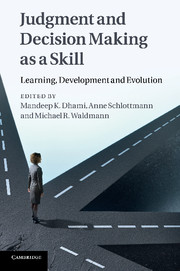Book contents
- Frontmatter
- Contents
- Figures
- Contributors
- Preface
- Acknowledgments
- Chapter cross-reference table
- Part I Evolutionary and neural bases of JDM
- Part II Developmental approaches to JDM
- 3 Judgment and decision making in young children
- 4 Judgment and decision making in adolescents
- 5 Aging and decision skills
- Part III Learning JDM
- Part IV Improving and aiding JDM
- Conclusion
- Index
- References
5 - Aging and decision skills
Published online by Cambridge University Press: 05 December 2011
- Frontmatter
- Contents
- Figures
- Contributors
- Preface
- Acknowledgments
- Chapter cross-reference table
- Part I Evolutionary and neural bases of JDM
- Part II Developmental approaches to JDM
- 3 Judgment and decision making in young children
- 4 Judgment and decision making in adolescents
- 5 Aging and decision skills
- Part III Learning JDM
- Part IV Improving and aiding JDM
- Conclusion
- Index
- References
Summary
Acknowledgments
Preparation of this chapter was supported by NSF Grant SES-0339204 awarded to Ellen Peters and EEC-0540865 (Quality of Life Technology Engineering Research Center) awarded to Carnegie Mellon University. Portions of this chapter are based on Peters, Hess, Västfjäll and Auman (2007). Adult age differences in dual information processes: Implications for the role of affective and deliberative processes in older adults’ decision making. Perspectives on Psychological Science, 2(1), 1–23. We thank the editors and reviewer for thoughtful comments.
Introduction
In this chapter we examine decision-making skills across the adult lifespan. Older adults (usually defined as ages 55 or 65 years and older) are a growing segment of the world population, and they make many personal, health, and financial decisions important to their quality of life. They also make some of society’s most consequential decisions as physicians, politicians, and Supreme Court justices. Of course, some older adults need considerable decision-making assistance, particularly in later life. As a result, understanding the effects of aging on the maintenance and facilitation of independent decision making is critical. Yet, age differences in decision making have been understudied, with decision research being conducted largely with samples of university students. Decision-making skills, however, are likely not static across the lifespan, and findings with younger adults (usually defined in the range of 18–39 years) may not generalize to middle-aged (often defined in the range of 35–64 years) or older-adult populations. In fact, research conducted to date demonstrates a series of age-related changes in skills that are expected to be relevant to decision making. These changes include declines in deliberative efficiency and motivated selectivity in the use of deliberative capacity, possible improvements in the use of affective information and in the acquisition of experience. Thus, across the adult lifespan, skills are acquired and attenuated in ways that likely influence older adults’ judgments and decisions. The aim of this chapter is to examine existing evidence for age-related changes in information processing and decision-making skills, as well as to provide suggestions for interventions and decision support tools that may facilitate the decisions of older adults.
- Type
- Chapter
- Information
- Judgment and Decision Making as a SkillLearning, Development and Evolution, pp. 113 - 140Publisher: Cambridge University PressPrint publication year: 2011
References
- 4
- Cited by



